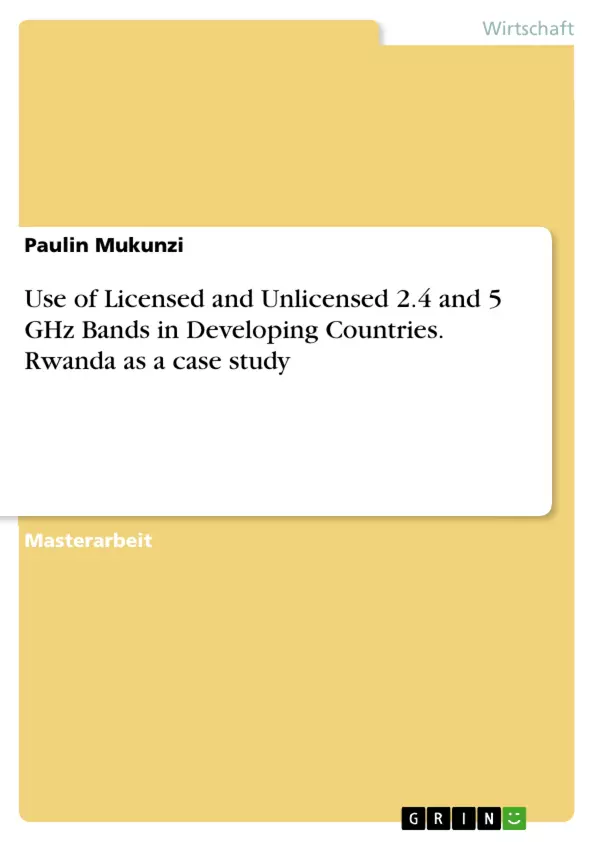In many countries, Spectrum Management has been under growing attention and debate in the last few years. Traditionally spectrum management has been largely based in a somewhat static approach, with allocations determined by the International Telecommunications Union (ITU), and national governments and telecommunication regulators responsible for spectrum assignment, monitoring and enforcement. In general, spectrum has been attributed on an exclusive basis, through a licensing regime. Recently several countries shifted towards different models, introducing different approaches such as spectrum pricing or trading, and exploring decentralized structures, such as the use of unlicensed bands. Currently, equipments based on unlicensed wireless technologies (WLAN, WiMax) are widely available commercially, inexpensive, and require little technical expertise for installation. Such equipment can be used to create data networks without investing time and money in acquiring a spectrum license or needing to depend on a telecommunications operator for use of the airwaves. Since on one hand the unlicensed spectrum and low-cost wireless technologies that operate in the 2.4 and 5 GHz bands is of particular value in that, it has the potential to substantially impact accessibility and availability of information and telecommunication services. And on other hand in the context of numerous institutional and structural obstacles that might occur to the entry of license-exempt, regulation provides a friendly environment for entrepreneurship while reducing any kind of barriers to the entry. This project aims to assess the opportunities for the 2.4 and 5 GHz bands in the context of developing countries, with a case study of Rwanda. In order to assess this opportunity in the context of Rwanda, I have surveyed every companies and institutions in the country on use of the 2.4 and 5 GHz bands.
Inhaltsverzeichnis
- Individual Project Declaration
- Dedication
- Acknowledgements
- My Profile
- Abstract
- Chapter 1: Introduction
- 1.1 Background of the study
- 1.2 Problem statement
- 1.3 Research objectives
- 1.4 Research questions
- 1.5 Significance of the study
- 1.6 Scope of the study
- 1.7 Limitations of the study
- 1.8 Organization of the study
- Chapter 2: Literature Review
- 2.1 Introduction
- 2.2 Wireless communication technologies
- 2.2.1 Radio frequency spectrum
- 2.2.2 Wireless communication standards
- 2.2.3 Wireless communication technologies in developing countries
- 2.3 Spectrum management
- 2.3.1 Spectrum allocation
- 2.3.2 Spectrum licensing
- 2.3.3 Spectrum regulation
- 2.4 The use of 2.4 and 5 GHz bands in developing countries
- 2.4.1 The 2.4 GHz band
- 2.4.2 The 5 GHz band
- 2.4.3 Challenges of using 2.4 and 5 GHz bands in developing countries
- 2.5 Case studies
- 2.5.1 Case study 1: India
- 2.5.2 Case study 2: South Africa
- 2.5.3 Case study 3: Brazil
- 2.6 Conclusion
- Chapter 3: Methodology
- 3.1 Introduction
- 3.2 Research design
- 3.3 Data collection methods
- 3.4 Data analysis methods
- 3.5 Ethical considerations
- 3.6 Conclusion
- Chapter 4: Results and Discussion
- 4.1 Introduction
- 4.2 The use of 2.4 and 5 GHz bands in Rwanda
- 4.2.1 Spectrum allocation and licensing
- 4.2.2 Spectrum regulation
- 4.2.3 Challenges of using 2.4 and 5 GHz bands in Rwanda
- 4.3 Case study: Rwanda
- 4.3.1 Background of Rwanda
- 4.3.2 The ICT sector in Rwanda
- 4.3.3 The use of 2.4 and 5 GHz bands in Rwanda
- 4.3.4 Challenges and opportunities
- 4.4 Discussion
- 4.5 Conclusion
- Chapter 5: Conclusion and Recommendations
- 5.1 Conclusion
- 5.2 Recommendations
- References
- Appendices
Zielsetzung und Themenschwerpunkte
Diese Dissertation befasst sich mit der Nutzung von lizenzierten und unlizenzierten 2,4- und 5-GHz-Bändern in Entwicklungsländern, wobei Ruanda als Fallstudie dient. Die Arbeit zielt darauf ab, die Herausforderungen und Chancen der Nutzung dieser Frequenzbänder in Entwicklungsländern zu untersuchen und Empfehlungen für eine effektive Spektrumsverwaltung zu geben.
- Spektrumverwaltung und -regulierung in Entwicklungsländern
- Die Nutzung von 2,4- und 5-GHz-Bändern für drahtlose Kommunikation
- Herausforderungen und Chancen der Nutzung dieser Frequenzbänder in Entwicklungsländern
- Fallstudie Ruanda: Analyse der aktuellen Situation und Empfehlungen für die Zukunft
- Die Rolle der Informations- und Kommunikationstechnologie (IKT) in der Entwicklung
Zusammenfassung der Kapitel
Kapitel 1 führt in das Thema ein und definiert die Forschungsfrage, die Forschungsziele und die Bedeutung der Studie. Es werden auch die Grenzen und die Organisation der Studie erläutert.
Kapitel 2 bietet einen umfassenden Literaturüberblick über drahtlose Kommunikationstechnologien, Spektrumsverwaltung und die Nutzung von 2,4- und 5-GHz-Bändern in Entwicklungsländern. Es werden auch Fallstudien aus anderen Ländern vorgestellt, um die verschiedenen Ansätze zur Spektrumsverwaltung zu beleuchten.
Kapitel 3 beschreibt die Forschungsmethodik, die in dieser Studie verwendet wurde. Es werden die Forschungsdesign, die Datenerhebungsmethoden, die Datenanalysemethoden und die ethischen Überlegungen erläutert.
Kapitel 4 präsentiert die Ergebnisse der Studie und diskutiert die Ergebnisse im Kontext der Literatur und der Fallstudien. Es werden die Herausforderungen und Chancen der Nutzung von 2,4- und 5-GHz-Bändern in Ruanda untersucht.
Schlüsselwörter
Die Schlüsselwörter und Schwerpunktthemen des Textes umfassen die Nutzung von 2,4- und 5-GHz-Bändern, Spektrumsverwaltung, drahtlose Kommunikation, Entwicklungsländer, Ruanda, Fallstudie, Herausforderungen, Chancen, Informations- und Kommunikationstechnologie (IKT), Entwicklung.
Häufig gestellte Fragen
Was ist der Vorteil von unlizenzierten 2,4- und 5-GHz-Bändern?
Diese Bänder erlauben es, Datennetzwerke (WLAN, WiMax) kostengünstig und ohne teure Spektrum-Lizenzen aufzubauen, was besonders in Entwicklungsländern den Zugang zu IKT erleichtert.
Warum ist Ruanda als Fallstudie relevant?
Ruanda zeigt exemplarisch die Herausforderungen und Chancen beim Aufbau eines IKT-Sektors in einem Entwicklungsland und wie Spektrumregulierung Unternehmertum fördern kann.
Welche Herausforderungen gibt es bei der Nutzung dieser Frequenzbänder?
Zu den Hürden zählen institutionelle Hindernisse, regulatorische Barrieren, technische Einschränkungen und die Notwendigkeit einer effektiven Überwachung zur Vermeidung von Interferenzen.
Wie funktioniert die traditionelle Spektrumverwaltung?
Traditionell wird das Spektrum exklusiv lizenziert und staatlich überwacht. Moderne Modelle setzen hingegen verstärkt auf Dezentralisierung und lizenzfreie Bereiche.
Welche Rolle spielt die IKT für die Entwicklung eines Landes?
Informations- und Kommunikationstechnologien sind zentrale Treiber für Wirtschaftswachstum, Bildung und den Zugang zu globalen Informationen.
- Citation du texte
- Paulin Mukunzi (Auteur), 2009, Use of Licensed and Unlicensed 2.4 and 5 GHz Bands in Developing Countries. Rwanda as a case study, Munich, GRIN Verlag, https://www.grin.com/document/292992



